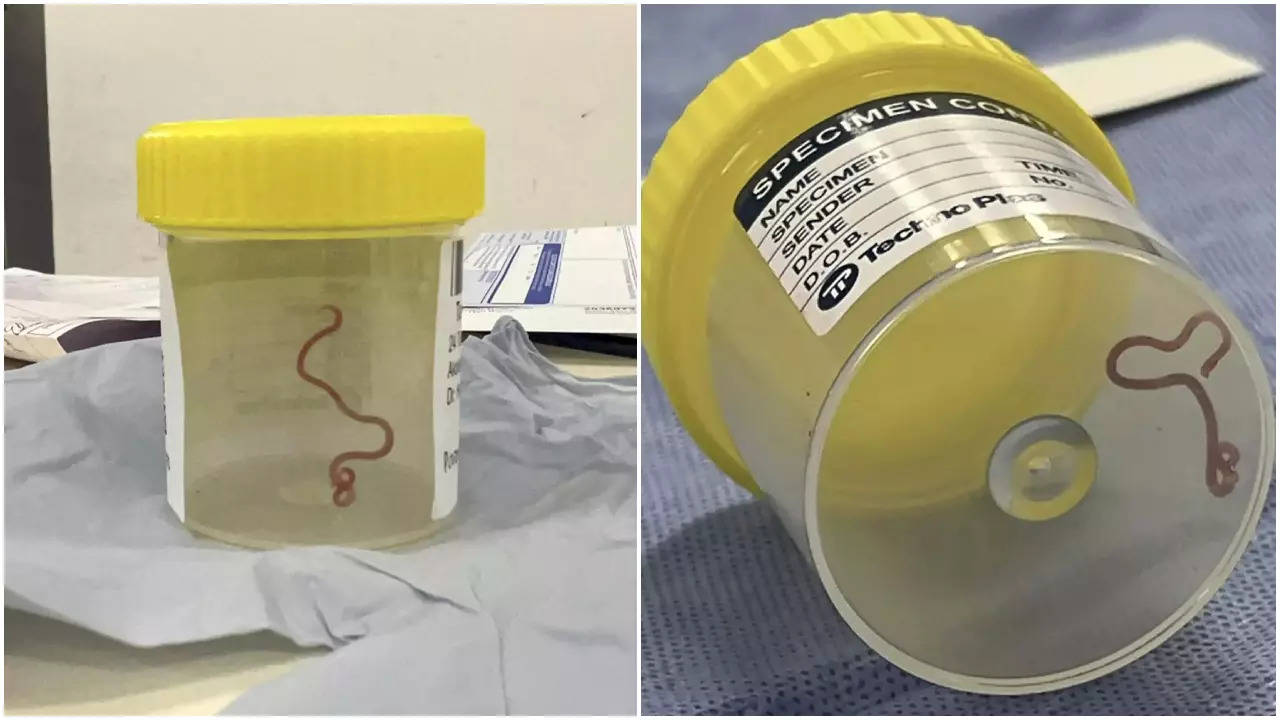A woman who had been grappling with memory lapses and depression has undergone surgery to remove an 8cm-long parasitic roundworm from her brain.
This 64-year-old woman from England, residing in New South Wales, Australia, was hospitalized in January 2021 due to abdominal pain, diarrhea, a persistent dry cough, and night sweats. Her condition progressed, adding forgetfulness and depression to her symptoms by 2022, prompting her referral to Canberra Hospital.
A brain MRI unveiled a mobile helminth, an 8cm-long parasitic roundworm – identified as ‘Ophidascaris robertsi’ – residing within a lesion in her right frontal lobe. With no alternative, doctors performed surgery and successfully extracted the roundworm, measuring 8cm in length and 1mm in diameter.
Ophidascaris robertsi, a roundworm typically associated with pythons, had never before been detected in humans. The case in Canberra Hospital marked the world’s first instance of this parasite infecting a human.
Ordinarily, this parasitic worm inhabits the digestive tracts of carpet pythons native to New South Wales, Australia.
The patient lived in proximity to a lake inhabited by carpet pythons. Despite no direct interaction with snakes, she frequently gathered native grasses, including warrigal greens, from the vicinity for culinary purposes. Medical professionals speculate that the woman may have inadvertently ingested worm eggs by consuming contaminated edible grasses. Nonetheless, the exact cause remains uncertain.
Doctors believe that, after hatching within her body, the larvae made their way to her brain. This migration could have been influenced by the immunosuppressive medication she was taking, which compromised her immune system.
“We hypothesized that she inadvertently consumed eggs either directly from the vegetation or indirectly by contamination of her hands or kitchen equipment,” the medical team said.
The ordeal commenced in 2021 with evolving symptoms. The woman’s initial hospitalization in Canberra was followed by inconclusive test results. Eventually, she was diagnosed with pneumonia of unknown origin and treated with steroids.
The patient’s recovery is progressing well, and her condition is under constant observation. Researchers are investigating whether an existing medical condition that compromised her immune system might have contributed to the survival of the larvae.
This 64-year-old woman from England, residing in New South Wales, Australia, was hospitalized in January 2021 due to abdominal pain, diarrhea, a persistent dry cough, and night sweats. Her condition progressed, adding forgetfulness and depression to her symptoms by 2022, prompting her referral to Canberra Hospital.
A brain MRI unveiled a mobile helminth, an 8cm-long parasitic roundworm – identified as ‘Ophidascaris robertsi’ – residing within a lesion in her right frontal lobe. With no alternative, doctors performed surgery and successfully extracted the roundworm, measuring 8cm in length and 1mm in diameter.
Ophidascaris robertsi, a roundworm typically associated with pythons, had never before been detected in humans. The case in Canberra Hospital marked the world’s first instance of this parasite infecting a human.
Ordinarily, this parasitic worm inhabits the digestive tracts of carpet pythons native to New South Wales, Australia.
The patient lived in proximity to a lake inhabited by carpet pythons. Despite no direct interaction with snakes, she frequently gathered native grasses, including warrigal greens, from the vicinity for culinary purposes. Medical professionals speculate that the woman may have inadvertently ingested worm eggs by consuming contaminated edible grasses. Nonetheless, the exact cause remains uncertain.
Doctors believe that, after hatching within her body, the larvae made their way to her brain. This migration could have been influenced by the immunosuppressive medication she was taking, which compromised her immune system.
“We hypothesized that she inadvertently consumed eggs either directly from the vegetation or indirectly by contamination of her hands or kitchen equipment,” the medical team said.
The ordeal commenced in 2021 with evolving symptoms. The woman’s initial hospitalization in Canberra was followed by inconclusive test results. Eventually, she was diagnosed with pneumonia of unknown origin and treated with steroids.
The patient’s recovery is progressing well, and her condition is under constant observation. Researchers are investigating whether an existing medical condition that compromised her immune system might have contributed to the survival of the larvae.
